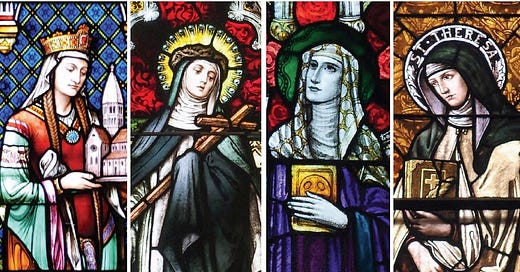Argument from Women II: The So-Called "Problem of Women in Ministry"
Another Unorganized Argument
I have always been in churches that saw no problem with female pastors. My parents are Foursquare, which was founded by a woman, and in high school I joined the Evangelical Presbyterian Church, where I regularly benefited from the preaching of a pastor who was a woman. In college, at a formerly PC(USA) school, I was privileged to study Scripture under fantastic professors who were women and received three years of mentorship from a female PC(USA) pastor through my involvement with campus ministry. Whenever I hear arguments about women being somehow not suited for teaching or leading, I don’t have to think hard about my own life to know that that’s just not true.
In Catholicism, however, only men may become priests. Early in my journey, my Whitworth campus pastor challenged me to make sure I was being consistent—did I think women could lead the Church, or not? When I began asking questions, though, I was surprised to learn that the Protestant debate about “women in ministry” does not even remotely map on to the division of labor in Catholicism.
For Protestants, the question always comes out in terms of whether Paul or others condone female leadership, whether the Bible considers women competent to lead God’s people. One student I took a New Testament class with (taught by a prominent female Bible scholar, I might add) told me that she thought women shouldn’t lead because they are more easily misled than men. If that’s true, you might wonder why corrupting Eve required Satan himself, while Adam gave in to a mere mortal. For Catholics, though, the limitation of the priesthood to men has nothing to do with the relative strengths and weaknesses of anyone involved.
“Pastor” and “priest” are not equivalent terms. Unlike pastors, priests are understood to act in persona Christi, in the person of Christ, during the Mass. They sacramentally take on the role of Christ with respect to the Church, which is why they are able to re-present His sacrifice, why they do the Gospel reading, and why they preach the Word. Recall that the Mass is not only a re-presentation of the death of Our Lord, but also a wedding feast. The Church is Christ’s bride, so the role of the priest during the Mass is to stand in for the groom. Christ, in the masculine mode, the giving mode, offers Himself as food in order to unite us to Himself. We, the Church, are collectively in the feminine mode, the receptive mode, so in receiving His body as food we are mystically bound to Him. It is the consummation of a cosmic wedding. It has nothing to do with men and women, and everything to do with maleness and femaleness, so the priest must be a valid representative of the groom. For the same reason, at baptism we say “I baptize you…” and not “We baptize you…” because it is not we as the Church or we as Christians who baptize, but Christ alone who baptizes; we just stand in for Him. The “I” is not “Eric,” but “Christ, as represented by Eric.”
This is why Catholics are not skittish about women holding important offices of leadership, either as organizers or theologians. Women are in ministry all over the Catholic Church, teaching as laypersons and as members of religious orders. Because Protestants don’t think of pastors as acting in persona Christi, it makes sense that there could be female pastors. Protestant services are not Masses, not wedding feasts, so the gender of the pastor is not liturgically relevant.
Interestingly, this solves a puzzle in the Bible. Women seem to do an awful lot, from composing theological treatises in song-form, to leading armies, to prophesying, to bearing God, to representing Paul as his official letter-bearer. The one role they never take on is not (as some Protestants claim) teacher, but priest. Although the Melchizidekian priesthood of Christ means that all Christians share in the new priestly office, the Catholic claim that God has sacramentally called men to some tasks and women to other tasks creates continuity with Israel’s worship without pretending that women do not equally image God.
< Last Argument | Back to the Unorganized List | Next argument >




